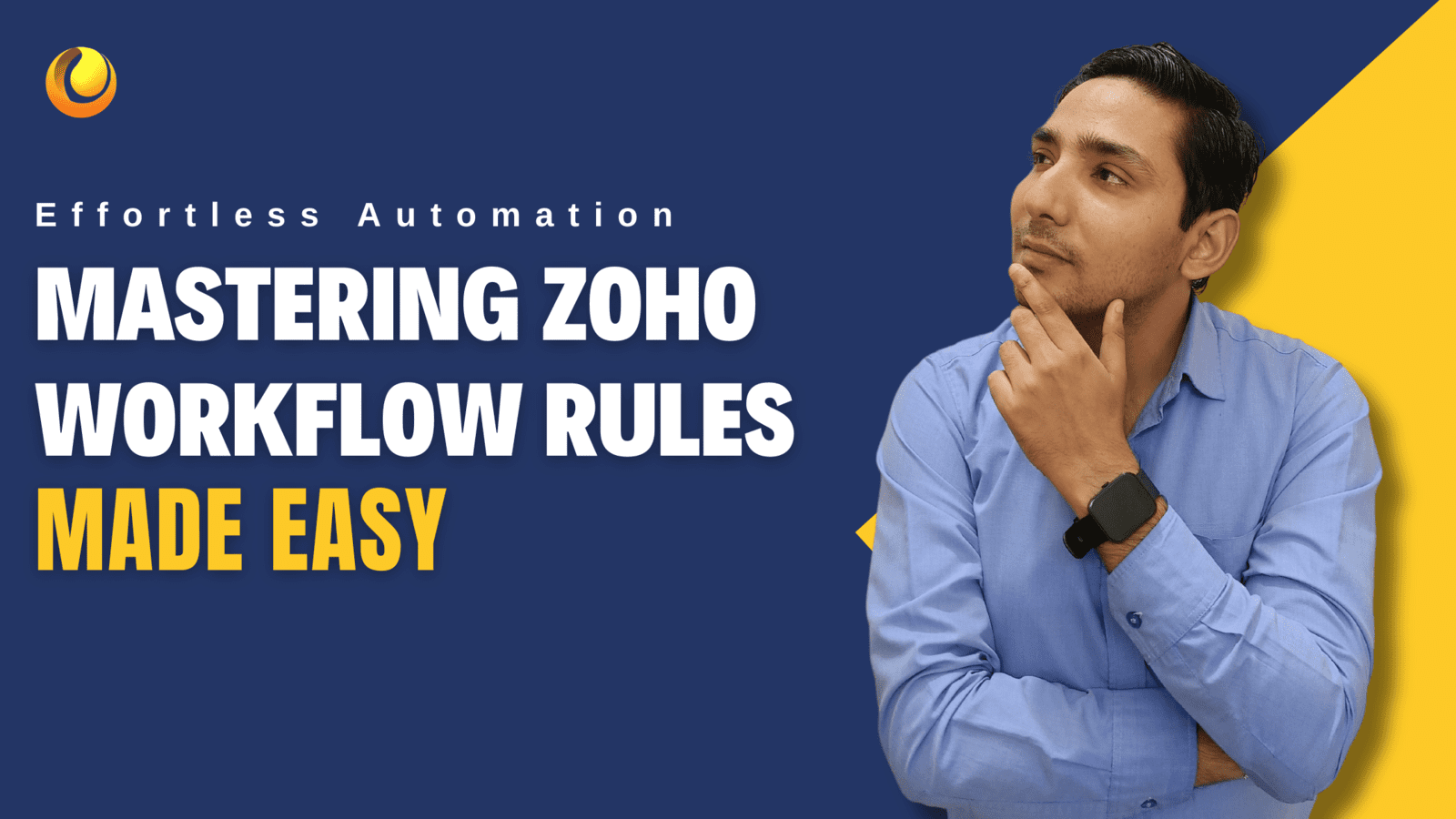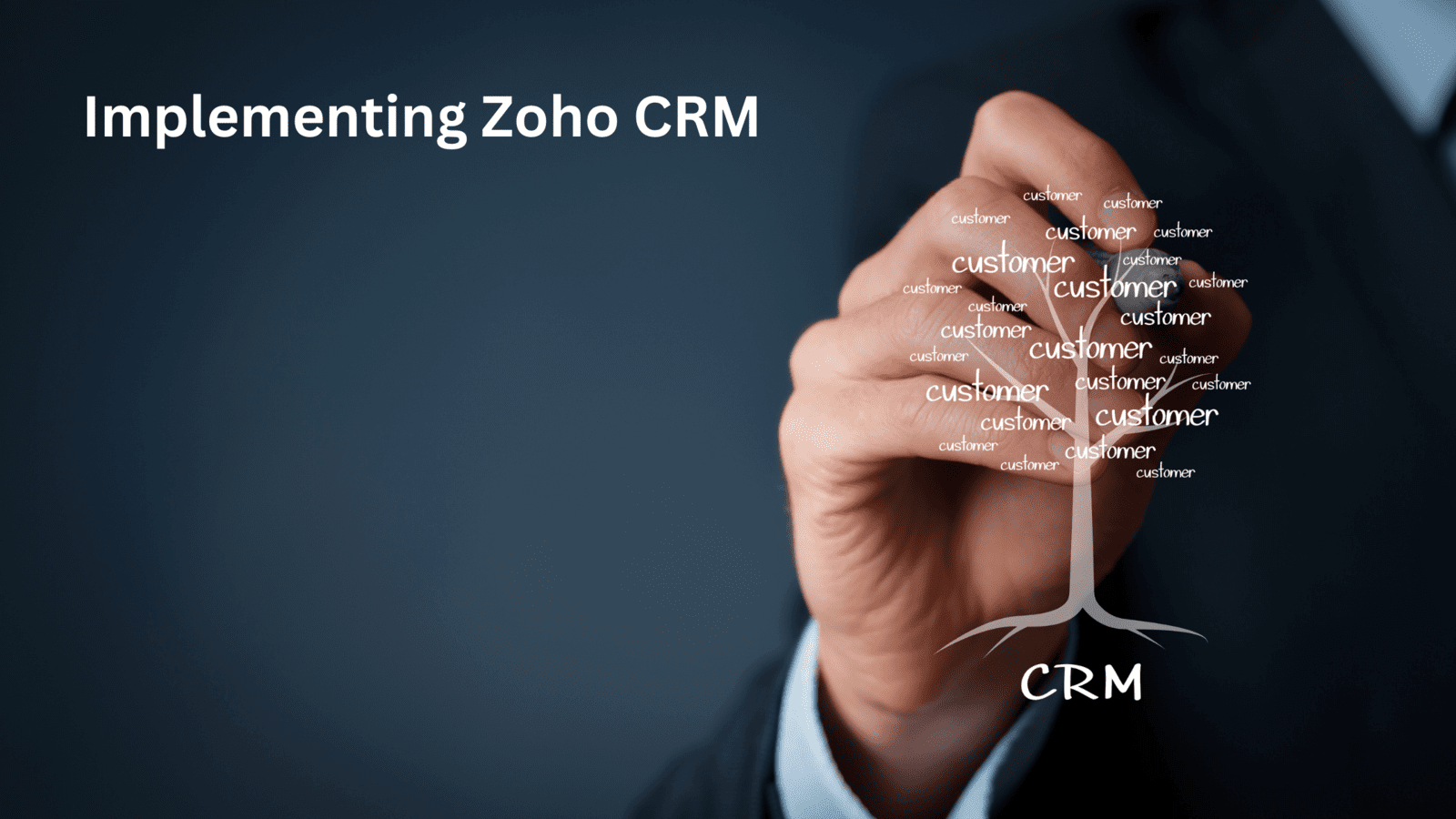

Introduction to Zoho Workflow Rules: Streamlining Your Business
Revealing the Purpose
Zoho Workflow Rules are designed to free businesses from the weight of manual tasks. Envision a world where routine actions, such as updating records, sending emails, or assigning leads, occur seamlessly without the need for manual intervention. This exemplifies the magic of workflow rules.
Automating Business Processes:
The purpose is clear – automation. Triggered by specific events or conditions, Zoho Workflow Rules swing into action, automating tasks and ensuring timely responses. From welcoming new leads to progressing deals through stages, these rules become your reliable assistants in navigating the intricacies of CRM.
In essence, Zoho Workflow Rules transform the way you manage your CRM, offering a simplified, automated approach to streamline your business operations.
In the journey of mastering Zoho Workflow Rules, the first important step is defining clear and achievable business goals. This strategic approach ensures that your Zoho CRM implementation aligns seamlessly with your overarching objectives.
Clarity in Purpose:
Begin by gaining a clear and thorough understanding of your business objectives. Whether it's increasing sales, enhancing customer satisfaction, or improving operational efficiency, articulate your goals with precision. This clarity forms the foundation for crafting effective Zoho Workflow Rules.
Alignment with CRM Implementation:
Once your goals are defined, the next step is aligning them with your Zoho CRM implementation. Identify specific areas where automation can contribute to goal attainment. For instance, if your goal is to boost customer engagement, consider workflow rules for personalised follow-up emails or automated customer feedback processes.
Prioritisation and Realism:
Prioritise your business goals based on urgency and impact. Realism is key – set achievable milestones within Zoho CRM that gradually contribute to the larger objectives. Whether it's shortening sales cycles or improving lead conversion rates, break down goals into actionable steps for a systematic approach.
Continuous Evaluation:
Business goals evolve and so should your Zoho CRM implementation. Regularly evaluate and adjust your workflow rules to align with any shifts in your business strategy. This adaptability ensures that your CRM remains a dynamic tool for achieving evolving business goals.
To master Zoho Workflow Rules, meticulous planning begins with documenting, analysing and mapping existing business processes. Start by creating a comprehensive inventory of current processes. Analyse each step's efficiency and relevance to your goals. Then, map out these processes visually, identifying dependencies and potential areas for automation within Zoho CRM. This step-by-step approach ensures a clear understanding of your business landscape, paving the way for strategic implementation of workflow rules and optimal utilisation of Zoho CRM for enhanced efficiency.
Watch our brief video to grasp the introduction of Zoho Workflow.

Implementing in Zoho CRM
Embarking on the journey of mastering Zoho Workflow Rules begins with a strategic implementation of Zoho CRM within your organisation. Kickstart the process by setting up essential organisation details. Access the Zoho CRM platform, navigate to settings and enter accurate information, including organisation name, address and industry type.
Next, customise modules relevant to your business, such as leads, contacts and deals. Tailor these modules to align with your workflow, ensuring a seamless integration of Zoho CRM into your daily operations.
To enhance user adoption, configure user roles and permissions, granting access based on job responsibilities. Additionally, integrate email accounts, enabling a centralised communication hub within Zoho CRM.
By meticulously implementing these foundational steps, your organisation lays the groundwork for a successful integration of Zoho CRM, setting the stage for the advanced automation capabilities offered by Zoho Workflow Rules.
Automating Business Workflows
Understanding the concept of automation within Zoho CRM is pivotal. Automation transcends the manual constraints of traditional business workflows, offering a streamlined and efficient approach.
Zoho CRM's automation empowers businesses by intelligently handling repetitive tasks, minimising errors and significantly reducing the time invested in routine processes. Whether it's automatically assigning leads, triggering follow-up emails, or updating records based on specific conditions, Zoho Workflow Rules automate these actions seamlessly.
By eliminating time-consuming workflows, automation enhances productivity, allowing teams to focus on strategic, high-value tasks. It ensures consistency, accelerates response times and contributes to overall operational efficiency. Embracing automation through Zoho Workflow Rules marks a transformative step towards a more agile and productive business environment.
Becoming Proficient in Zoho Workflow Rules: Monitoring and Optimising Workflow Rules
As you delve into the intricacies of Zoho Workflow Rules, it's crucial to master the art of monitoring and optimising their performance. Begin by regularly reviewing the execution logs within Zoho CRM. This provides valuable insights into rule triggers, actions and any potential errors.
To ensure optimal performance, analyse the efficiency of your rules in real-world scenarios. Assess their impact on processes and adjust trigger criteria or actions accordingly. Keep an eye on system resources and response times to maintain a seamless workflow.
Periodically revisit and refine your workflow rules. Business dynamics evolve and so should your automation strategies. Whether it's tweaking conditions, introducing new actions, or adapting to changes in business goals, constant optimisation ensures that your Zoho Workflow Rules remain finely tuned and aligned with your organisation's objectives. This iterative process is key to mastering Zoho Workflow Rules and leveraging them for sustained business success.
Conclusion: Mastering Zoho Workflow Rules
In the journey of mastering Zoho Workflow Rules, we've explored the transformative power of automation within Zoho CRM. From understanding the purpose of workflow rules to implementing and optimising them, each step contributes to a more efficient and streamlined business operation.
By defining clear business goals, documenting existing processes and strategically implementing Zoho CRM, businesses lay a solid foundation for workflow automation. The concept of automating business workflows through Zoho Workflow Rules emerges as a game-changer, eliminating time-consuming tasks and fostering a more productive work environment.
As you navigate through the intricacies of Zoho Workflow Rules, the importance of monitoring and optimisation becomes evident. Regularly assessing rule performance, adapting to evolving business needs and fine-tuning your automation strategies ensure that Zoho Workflow Rules remain dynamic and aligned with organisational objectives.
In conclusion, mastering Zoho Workflow Rules is not just about automation; it's about realising the full potential of Zoho CRM to propel your business towards heightened efficiency and success. Embrace the power of automation, continually refine your strategies and watch as your business workflows seamlessly transform into a well-orchestrated symphony of productivity.
Our Final Words
We provide a complimentary 45-minute consulting session with us. If you're already using a sophisticated system, no worries! We're offering a free CRM audit to guarantee smooth operations. If your goal is to achieve exceptional customer experiences, we're the friendly guides for the task. Explore our blog, a valuable repository of information that can offer you a competitive edge. Seize the opportunity for a free chat with us and let's embark on the journey of delivering outstanding customer experiences together!
Thank you for reading and we eagerly look forward to the opportunity to collaborate with you soon!





